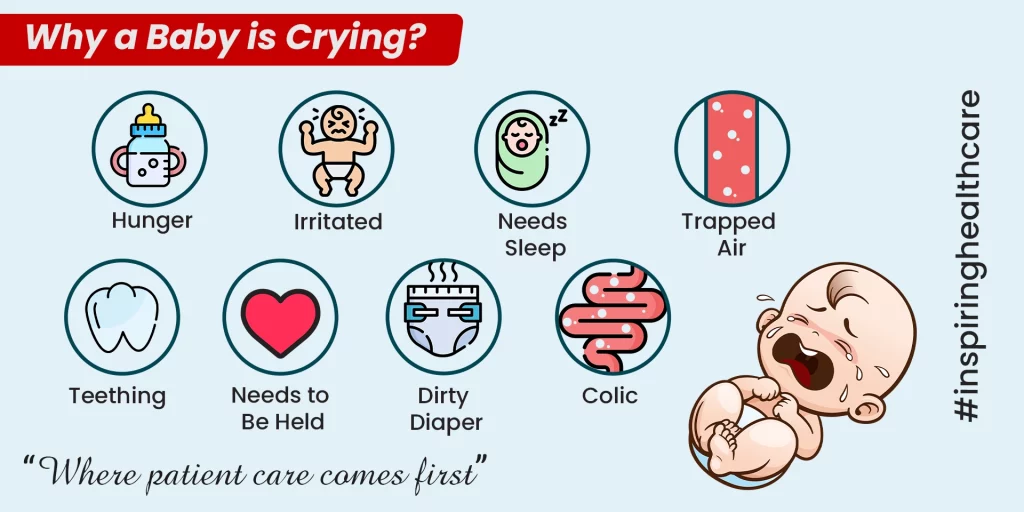Medically Reviewed by: Dr. Sonali Pandey– DCH, MBBS, DNB Paediatrics
All Baby Cries; it’s a natural part of their development. On average, newborns cry for 1 to 4 hours a day.
Your role as a caregiver is to determine the cause of the crying and decide how to soothe the baby, if necessary. Rest assured, you can’t spoil your baby with too much attention.
Be prompt in responding to your baby’s cries. Sometimes, you’ll be able to assist, while other times, your mere presence will offer comfort. Though hearing your baby cry can be challenging, remember that it does not reflect your caregiving abilities.
Why Do Babies Cry?
Babies cry and become fussy—it’s a common part of infancy. Typically, a newborn may cry for about 2–3 hours daily during their first 6 weeks, with crying peaking in the initial 3 months.
For new parents, adjusting to their baby’s needs while coping with sleep deprivation is a common experience. They quickly learn to attend to various reasons for their baby’s crying, including hunger, fatigue, the need for burping, overstimulation, a wet or dirty diaper, or discomfort due to temperature.
Addressing these needs often calms the baby. However, there are instances when crying persists despite attempts to soothe them.

Top 7 Reasons Your Baby is Crying:
- Hunger
- Both breastfed & bottle-fed babies exhibit this cry. Initially, it may start as fussiness but escalates into louder & more demanding cries. It is usually preceded by hunger causes like rooting, hand-to-mouth movement & lip smacking.
- Listen for: A siren-like cry accompanied by hand-to-mouth gestures and head turning towards feeding sources.
- Discomfort – Dirty Nappy
- Babies, especially older ones, may cry when uncomfortable or not in their preferred position. Watch for squirming, head-turning, or reaching.
- Among various cries, a signal for a wet or full nappy is prominent.
- Listen for: A persistent cry, reflecting a mix of various cries, until the discomfort is alleviated. They may desire to be held or put down depending on their preference.
- Illness/ Pain
- A distressing cry often accompanies sickness. Observe other symptoms like lethargy, watery eyes, or nasal issues. Monitor the temperature for fever and seek medical advice if necessary.
- Listen for: Continuous crying, sometimes sounding like tired moans, with high pitch but low intensity, and occasional pauses.
- Fatigue ( Tired Baby)
- Crying serves as communication for babies. Watch for cues such as yawning, eye closing, jerky movements, fist-sucking, or thumb-sucking.
- Listen for: High-pitched cries with increasing intensity until needs are met.
- Overstimulated Baby
- When your baby is bombarded with too much sensory input—bright lights, loud noises, or new experiences—they can become overwhelmed. To help your baby calm down, adjust their environment. Draw the curtains, dim the lights, introduce white noise like a fan or vacuum, or play soothing nature sounds.
- Listen for: Intense cries with rising and falling patterns, akin to those of a baby experiencing gas pain. Your baby might also try to turn away from irritating stimuli.
- Bored Baby
- Babies cry to communicate their needs, but sometimes, it’s simply because they’re bored. There are two perspectives on boredom-induced crying:
- i) Babies cry to seek attention, hoping someone will respond. This can result in restlessness and fussiness.
- ii) Bored babies crave stimulation and may become overstimulated if not engaged, leading to more crying.
- We believe that fostering a baby’s curiosity and letting them explore their surroundings is beneficial for their development.
- Listen for: Initial attempts to attract attention with cooing sounds, escalating to fussiness and indignant cries if ignored. This pattern resembles that of an overstimulated baby.
- Babies cry to communicate their needs, but sometimes, it’s simply because they’re bored. There are two perspectives on boredom-induced crying:
- Colicky Baby
- Colic, characterized by excessive crying and fussiness in babies, remains a mystery in terms of its cause. Unlike specific medical conditions like acid reflux, colic is persistent and challenging to soothe, often beginning in the first few days of life.
- For parents dealing with colic, the inability to comfort their baby can be incredibly stressful. While a doctor can rule out underlying medical issues, many colicky babies cry excessively without a clear cause.
- Listen for: Prolonged crying episodes with intense wails or screams, accompanied by irritability, fussiness, and restlessness. While most babies cry for a few hours a day, colicky babies cry even more, typically worsening in the late afternoon or evening.
How to Comfort a Crying Baby
Understanding why a baby cries is crucial, as it helps address their needs effectively. Babies communicate through various sounds, each conveying different messages based on their circumstances and requirements.
To soothe a crying baby, it’s essential to grasp the meaning behind their cries and respond accordingly. Here are some strategies:
- Decode their cries to discern their needs and offer appropriate comfort.
- If hunger is the issue, find a cozy spot to feed them.
- Swaddle them snugly with a soft cotton or muslin wrap if they’re indicating tiredness, aiding their sleep.
- Address any discomfort due to nasal congestion by wiping their nose or using a nasal aspirator.
- Adjust their clothing according to the environment to ensure they’re neither too hot nor too cold.
- Attend to their diaper promptly if it’s wet or soiled.
- Provide a soothing warm bath to ease their distress.
- Embrace them skin-to-skin, offering comfort through your touch and heartbeat.
- Create a calming atmosphere with gentle lullabies, white noise, or nature sounds.
By responding attentively to a crying baby, you can establish a strong bond and provide them with the comfort they need.
Looking for personalized guidance for your baby’s health? Look no further! Our dedicated team of experts is here to provide tailored care and support for your little one’s well-being.
Book your consultation now at Sanjivini Super Speciality Hospital Lucknow, for specialized assistance and personalized recommendations. Your baby’s health is our priority.
Frequently Asked Questions
- Why do babies cry so much?
- Babies cry as a way to communicate their needs and discomforts, such as hunger, fatigue, or discomfort due to a wet diaper.
- How can I soothe my colicky baby?
- Comfort measures like gentle rocking, white noise, and swaddling can help soothe a colicky baby’s crying episodes.
- Is it normal for my baby to cry for hours on end?
- While some crying is normal, excessive crying may indicate underlying issues. Consult with a healthcare provider if you’re concerned about your baby’s crying patterns.
- Should I pick up my baby every time they cry?
- Responding promptly to your baby’s cries helps build trust and security. You can’t spoil a baby with too much attention in their early months.

